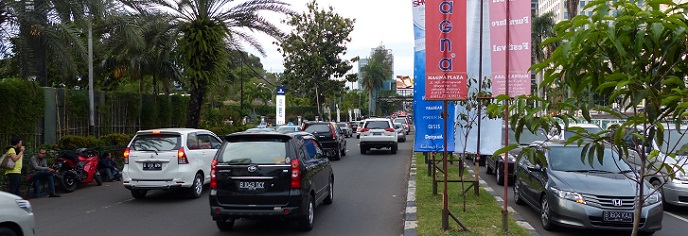Fact of Automotive Industry Indonesia
Nov 19, 2015
Automotive Industry Indonesia Too Dependent on Imported Raw Materials
The structure of Indonesia's automotive industry remains weak as it is too dependent on imports of raw materials, making sales prices of cars highly vulnerable to the volatile Indonesian rupiah. The automotive industry has been one of the many local industries that has been plagued by Indonesia's economic slowdown and fragile rupiah (amid looming tighter monetary policy in the USA) as people's purchasing power has weakened. In the first ten months of 2015, Indonesian car sales stood at a total of 853,008 units, down 18 percent from car sales in the same period last year.
An example shows the strong influence of the rupiah-US dollar exchange rate on the price of Indonesian cars. When the low-cost green car (LCGC) was introduced on the Indonesian market in September 2013, the price of a Toyota Agya (a popular LCGC) was set in the range of IDR 97 - 120 million with the average exchange rate of about IDR 11,200 per US dollar in September 2013. Currently, however, the same car model is sold at a price range of IDR 110 - 132 million as the rupiah is now trading at IDR 13,711 per US dollar. The rupiah depreciated 22.4 percent against the greenback between September 2013 and November 2015, hence contributing to the average selling price of a Toyota Agya rising by 12 percent over the same period, despite the fact that government regulations require the LCGC to consist for (at least) 85 percent of locally-manufactured components (this regulation was one of the requirements for car manufacturers in order to obtain tax incentives for the manufacturing of the LCGC in Indonesia).

Raw materials that are imported from abroad for the automotive industry include automotive steel, resin, and aluminum. Such imports are needed as the domestic upstream manufacturing industry in Indonesia is still underdeveloped.
Fortunately, there are some positive developments. In mid-2014, Indonesia's largest steel producer Krakatau Steel formed a joint venture (named Krakatau Nippon Steel Sumikin) with Nippon Steel & Sumitomo Metal Corporation (NSSMC) to build a USD $400 million automotive flat steel factory in West Java. Production capacity of the new plant, which is expected to become operational in 2017, is designed to reach 480 thousand tons per year (state-controlled Krakatau Steel has a 20 percent stake in this project).
Indonesian Car Sales (CBU):
| Month | Sold Cars 2012 | Sold Cars 2013 | Sold Cars 2014 | Sold Cars 2015 |
| January | 76,427 | 96,718 | 103,609 | 94,194 |
| February | 86,486 | 103,278 | 111,824 | 88,740 |
| March | 87,917 | 95,996 | 113,067 | 99,411 |
| April | 87,144 | 102,257 | 106,124 | 81,600 |
| May | 95,541 | 99,697 | 96,872 | 79,375 |
| June | 101,746 | 104,268 | 110,614 | 82,172 |
| July | 102,511 | 112,178 | 91,334 | 55,615 |
| August | 76,445 | 77,964 | 96,652 | 90,538 |
| September | 102,100 | 115,974 | 102,572 | 93,038 |
| October | 106,754 | 112,039 | 105,222 | 88,325 |
| November | 103,703 | 111,841 | 91,327 | |
| December | 89,456 | 97,706 | 78,802 | |
| Total | 1,116,230 |
1,229,916 |
1,208,019 | 853,008 |
| 2008 | 2009 | 2010 | 2011 | 2012 | 2013 | 2014 | |
| Indonesian Car Sales (number of car units) |
607,805 | 486,061 | 764,710 | 894,164 | 1,116,230 |
1,229,916 | 1,208,019 |
| Indonesian Exports (number of car units) |
100,982 | 56,669 | 85,769 | 107,932 | 173,368 | 170,907 | 202,273 |
Source: Gaikindo
Indonesian Car Exports
Currently, Toyota Motor Manufacturing Indonesia (TMMIN) and affiliated Astra Daihatsu Motor (ADM) are Indonesia's largest exporters of completely built up (CBU) vehicles. In the first eight months of 2015, shipments of Toyota vehicles stood at 122,000 units, up 25 percent from exports in the same period last year. However, Indonesia is still a small player in terms of worldwide car exports. This year, TMMIN targets to see 175,000 Toyota units (CBU) exported abroad. Two new markets that the company tries to tap are North Africa and Oceania (especially Australia).
Based on the latest data from the Indonesian Automotive Industry Association (Gaikindo), Indonesia exported a total of 163,828 cars (CBU) in the first nine months of 2015 (and imported 64,873 units over the same time). Total installed domestic car production capacity stands at 2 million units (per year).
Meanwhile, Mitsubishi and Daihatsu are the best brands in terms of customer satisfaction in Indonesia (followed by Datsun on third position) according to the latest Sales Satisfaction Index compiled by JD Power.
Further Reading:
Source: Indonesia Investments